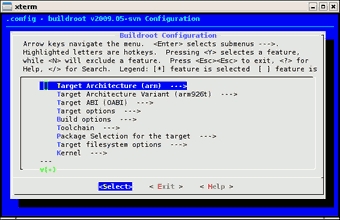Buildroot: making Embedded Linux easy
Buildroot is a set of Makefiles and patches that makes it easy to
generate a complete embedded Linux system. Buildroot can generate any
or all of a cross-compilation toolchain, a root filesystem, a kernel
image and a bootloader image. Buildroot is useful mainly for people
working with small or embedded systems, using various CPU
architectures (x86, ARM, MIPS, PowerPC, etc.) : it automates the
building process of your embedded system and eases the
cross-compilation process.
The major Buildroot features are:
- Can handle everything in your embedded system development
project: cross-compiling toolchain, root filesystem generation,
kernel image compilation and bootloader compilation. Buildroot is
also sufficiently flexible that it can also be used for only one or
several of these steps.
- Is very easy to set up, thanks to its menuconfig and
xconfig configuration interfaces, familiar to all embedded Linux
developers. Building a basic embedded Linux system with Buildroot
typically takes 15-30 minutes.
- Supports several hundreds of packages for userspace
applications and libraries: X.org stack, Gtk2, Qt, DirectFB, SDL,
GStreamer and a large number of network-related and system-related
utilities and libraries are supported.
- Supports multiple filesystem types for the root
filesystem image: JFFS2, UBIFS, tarballs, romfs, cramfs, squashfs
and more.
- Can generate an uClibc cross-compilation toolchain, or re-use
your existing glibc, eglibc or uClibc cross-compilation
toolchain
- Has a simple structure that makes it easy to understand
and extend. It relies only on the well-know Makefile language.
Buildroot is maintained by Peter Korsgaard, and licensed under the
GNU
GENERAL PUBLIC LICENSE V2 (Or later). Stable releases are
delivered every three months.
